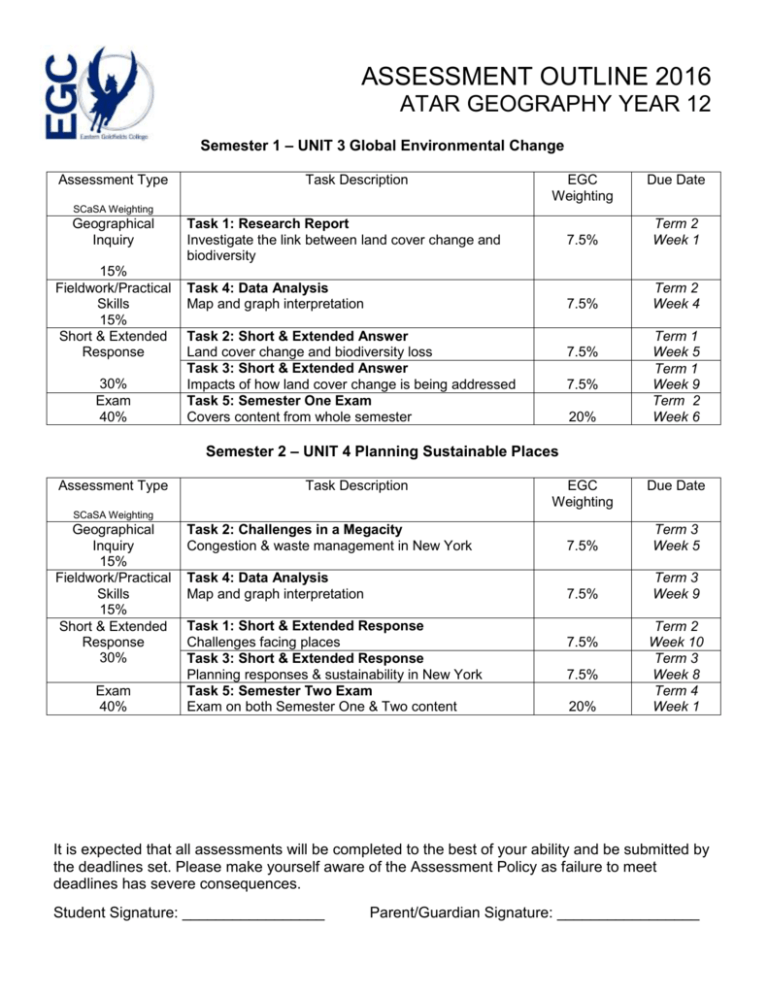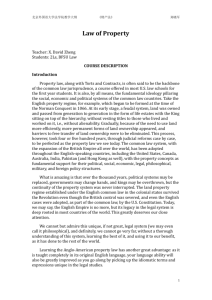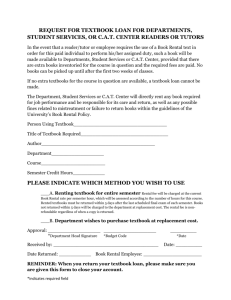atar geography
advertisement

ASSESSMENT OUTLINE 2016 ATAR GEOGRAPHY YEAR 12 Semester 1 – UNIT 3 Global Environmental Change Assessment Type Task Description EGC Weighting Due Date SCaSA Weighting Geographical Inquiry 15% Fieldwork/Practical Skills 15% Short & Extended Response 30% Exam 40% Task 1: Research Report Investigate the link between land cover change and biodiversity Task 4: Data Analysis Map and graph interpretation Task 2: Short & Extended Answer Land cover change and biodiversity loss Task 3: Short & Extended Answer Impacts of how land cover change is being addressed Task 5: Semester One Exam Covers content from whole semester 7.5% Term 2 Week 1 7.5% Term 2 Week 4 7.5% 7.5% 20% Term 1 Week 5 Term 1 Week 9 Term 2 Week 6 Semester 2 – UNIT 4 Planning Sustainable Places Assessment Type Task Description EGC Weighting Due Date SCaSA Weighting Geographical Inquiry 15% Fieldwork/Practical Skills 15% Short & Extended Response 30% Exam 40% Task 2: Challenges in a Megacity Congestion & waste management in New York 7.5% Term 3 Week 5 Task 4: Data Analysis Map and graph interpretation 7.5% Term 3 Week 9 Task 1: Short & Extended Response Challenges facing places Task 3: Short & Extended Response Planning responses & sustainability in New York Task 5: Semester Two Exam Exam on both Semester One & Two content 7.5% 7.5% 20% Term 2 Week 10 Term 3 Week 8 Term 4 Week 1 It is expected that all assessments will be completed to the best of your ability and be submitted by the deadlines set. Please make yourself aware of the Assessment Policy as failure to meet deadlines has severe consequences. Student Signature: _________________ Parent/Guardian Signature: _________________ COURSE OUTLINE 2016 ATAR GEOGRAPHY YEAR 12 Week Topics/Syllabus Assessment Resources Term 1 1 2-3 4 5-6 7 - 10 Week Overview of nature, extent cause & consequences of land cover change: Define the concepts of environment, natural and anthropogenic biomes, land cover change, ecosystem structure & dynamics, biodiversity loss, climate change & sustainability. Identify & classify examples of land cover changes. Geographical skills: mapping, remote sensing skills, statistical data, ICT & geographical information systems. Implications of anthropogenic biomes to the functioning of the world’s ecosystems. Impact of world population growth, growing affluence, advances in technology on the nature, rate & extent of land cover change & biodiversity loss. Land cover change: Processes of land cover change. Differences in the process of land cover change between countries. Projecting changes in land cover. Indigenous peoples’ land management practices & their impact on land over time. Impacts of land cover on local & regional environments. World Biomes: Spatial distribution of the world’s biomes. Key elements of ecosystem structure and dynamics. Biodiversity: Causes & rate of declining biodiversity. Fossil records. Loss of ecosystems as a major type of evidence for loss of biodiversity in recent human history. Projected impacts of loss of biodiversity. Interrelationships between land cover & biodiversity loss. Effects of biodiversity loss in natural & anthropogenic biomes. Topics/Syllabus textbook Task 1- handout Due Term 2 Week 1 textbook textbook Task 2 Week 5 Task 3 Week 9 Assessment textbook textbook Resources Term 2 1-2 3-4 5 6 Land cover restoration: Land cover restoration & rehabilitation, mitigation of future land cover changes, including preservation strategies. Land management: How agroforestry addresses the impact of land & soil degradation in the Western Australian wheat belt. Evaluation of agroforestry, giving consideration to environmental, economic & social benefit & costs. Evaluation of one alternative approach to the management of land & soil degradation in the Western Australian wheat belt. Using the concepts of sustainability to determine the extent to which the approach has the potential to address the issue into the future. Revision: Revision of semester one course Exam: Semester one examination Task 1 Due Week 1 textbook Task 4 Week 4 textbook textbook Task 5 Week 6 textbook Task 2- handout textbook END OF SEMESTER 1 Overview of places & their challenges: Process of 7-8 9 - 10 Week urbanization & its implications for world population growth & human wellbeing in urban & rural places. Economic & environmental interdependence of urban & rural places. Historical, cultural, economic & environmental factors that have contributed to the spatial distribution or urban and rural places in Australia. Processes of urban sprawl, invasion & succession renewal, planning, land use competition, inertia & agglomeration that have contributed to the characteristics & functions of urban and rural places in Australia. Changing demographic, economic & social characteristics, socioeconomic & cultural distribution in urban & rural places in Australia. Challenges facing places: Overview of challenges facing rural & remote places in Australia. Overview of challenges facing megacities & Australian metropolitan & regional centres Due Term 3 Week 5 Topics/Syllabus Assessment Task 1 Week 10 textbook Resources Term 3 1 -3 4-5 6-9 10 Week Depth Study- Perth: Geographical inquiry skills. Investigate Perth’s site, situation, internal & external morphology & functions, demographics, challenges of transportation, congestion, environmental degradation, urban sprawl. Investigate nature, scope & causes of each challenge & the implications for metropolitan Perth. Views & attitudes of major stakeholder groups related to each challenge. Planning strategies: Range of planning strategies that have been used to address each challenge & how these compare with &/or have been informed by responses implemented in other places both inside & outside Australia. Extent to which the planning strategies adopted in metropolitan Perth have been or could be informed by the concept of sustainability. Strategies adopted in metropolitan Perth to address these challenges. Extent to which these strategies have enhanced its sustainability & liveability. Depth study- New York: New York’s site, situation, internal & external morphology & functions, demographics. Challenges with congestion & waste management. Investigate the nature, scope & causes of each challenges & implications for New York. Range of planning strategies used to address each challenge & how they compare with/or have been informed by responses in other world megacities. Extent to which the planning strategies adopted in New York have been, or could be informed by the concept of sustainability. Strategies adopted in New York to address these challenges. Extent to which these strategies have enhanced the sustainability & liveability of New York. Revision: Revision of both Semester One and Semester Two content Topics/Syllabus textbook Task 2 Due Week 5 textbook Task 3 Week 8 textbook Task 4 Week 9 textbook Assessment Resources Term 4 1 2 Semester 2 Exam/Revision: Semester Two exams. Revision & feedback from Semester Two exam. Final preparation for WACE exam. Revision: Revision & feedback from Semester Two exam. Final preparation for WACE exam. Task 5 Week 1 textbook END OF SEMESTER 2







